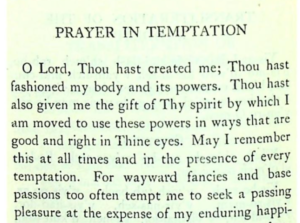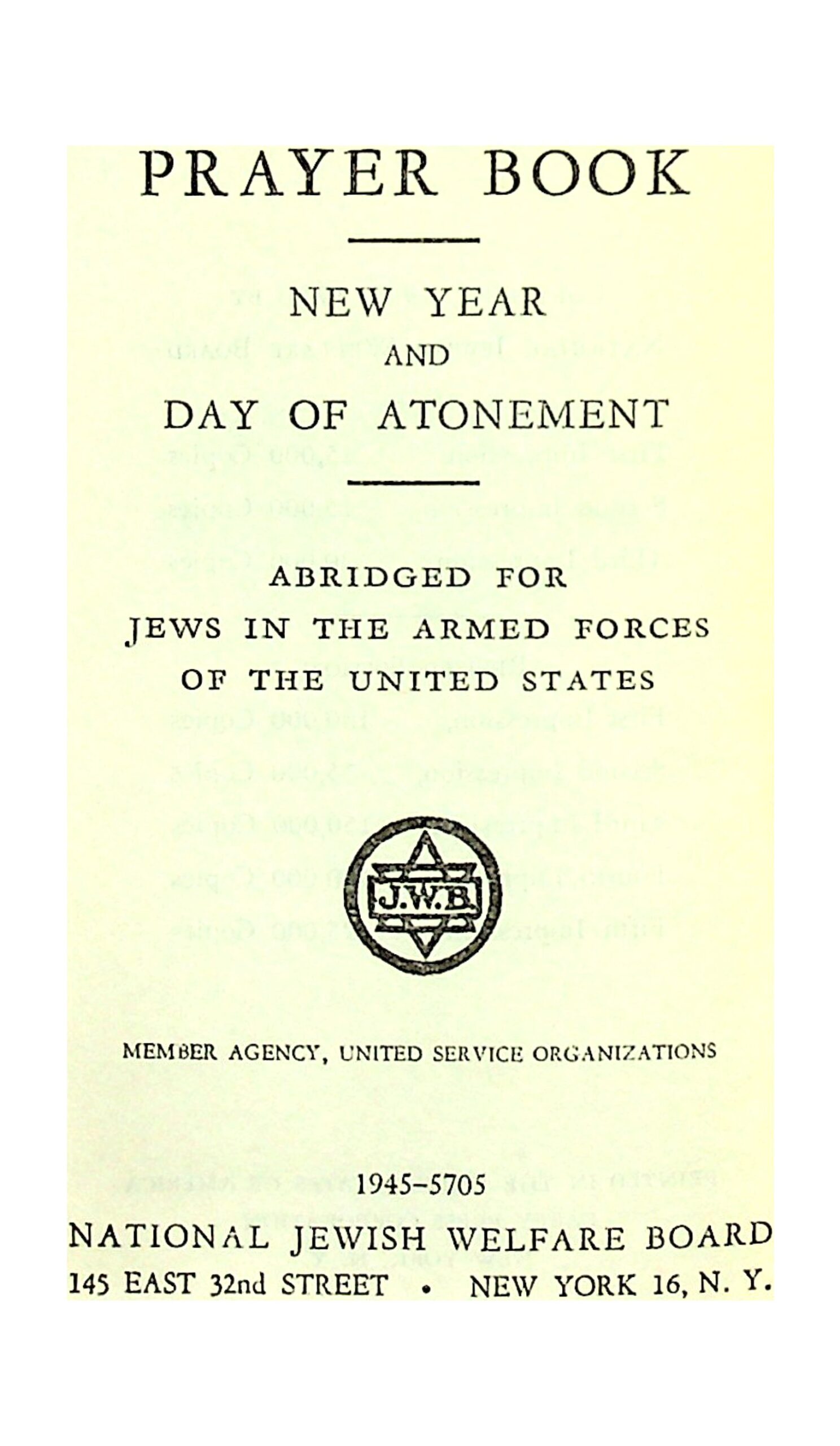Contributor(s): Shared on: 19 April 2022 under the Creative Commons Zero (CC 0) Universal license a Public Domain dedication Categories: Tags: | Contribute a translation | Source (English) |
|---|
|
Prayer in Temptation | |
O Lord, Thou hast created me;
Thou hast fashioned my body
and its powers. | |
Thou hast also given me
the gift of Thy spirit
by which I am moved to use these powers
in ways that are good and right
in Thine eyes. | |
May I remember this at all times
and in the presence of every temptation.
For wayward fancies
and base passions
too often tempt me
to seek a passing pleasure
at the expense of my enduring happiness,
and divert me from my purpose
to perform Thy will. | |
Give me the strength
to banish thoughts and desires
which I know to be wrong. | |
May I do nothing
that can bring dishonor
on myself,
on those I love
or on any human being. | |
May I not degrade the physical,
mental and emotional powers
that Thou hast given me
by dissipating them in intemperate,
self-indulgent and immoral behavior. | |
Create in me a clean heart, O God,
and renew a steadfast spirit within me
that I may be worthy of those blessings
which flow from a clear conscience
and a pure love of Thee
and of Thy children,
Amen. |
This “Prayer in Temptation” can be found in the Abridged Prayer Book for the Jews in the Armed Forces of the United States (Jewish Welfare Board 1941), p. 120. The prayer is found under the title, “[Prayer] For Moral Strength” in the Prayer Book for Jewish Personnel in the Armed Forces of the United States (1958), p. 344. The specific details of concern are left to the readers of this prayer although it may directly relate to the larger military education campaigns against venereal disease. For more information, find Adrienne Mueller’s honors thesis, “Prostitutes, Prophylactics, and Propaganda: The Venereal Disease Campaign and the Fight for Control of Female Sexuality During WWII” (University of Colorado Boulder 2018). As far as we know, this prayer is unique to this prayerbook, although the text recalls the waking prayer “Elohai Neshama.” The author of the prayer is also not known; three well-known rabbis contributed to the siddur: David de Sola Pool, Eugene Kohn, and Solomon B. Freehof. It would be good to know if similar prayers appeared in the religious resources for chaplains of other religious traditions. If you know more details concerning its authorship or whether it was published elsewhere, please leave a comment or contact us. –Aharon Varady Source(s)
David de Sola Pool (דוד די סולה פול; 1885–1970) was the leading 20th-century Sephardic rabbi in the United States. A scholar, author, and civic leader, he was a world leader of Judaism. Born in London, England, de Sola Pool was descended from an old and renowned family of rabbis and scholars, de Sola, which traces its origins to medieval Spain. His great grandparents were Rabbi (R.) David Aaron de Sola and Rebecca Meldola, his great-great grandfather was Haham Raphael Meldola, a prominent English Rabbi. He was also related to R. Abraham de Sola, R. Henry Pereira Mendes and Dr. Frederick de Sola Mendes. He studied at the University of London. He held a doctorate in ancient languages, summa cum laude, from the University of Heidelberg. In 1907, de Sola Pool was invited to become the rabbi of Congregation Shearith Israel — often called the Spanish and Portuguese Synagogue — located in New York City, the oldest Jewish congregation in the United States. He served as its rabbi for 63 years. Eugene Kohn (January 26, 1887 - April 1, 1977) was an American Reconstructionist rabbi, writer and editor. Born in Newark, New Jersey he attended the Jewish Theological Seminary of America and in 1912 received ordination. It was here that he met Rabbi Mordecai Kaplan who taught him homiletics. Between 1912 and 1939 he served as a congregational rabbi in Conservative synagogues in the U.S. states of Maryland, New Jersey, New York, Wisconsin and Ohio. He also served as the president of the Rabbinical Assembly 1936-1937. He played a central role in the Reconstructionist movement. He edited its journal The Reconstructionist and, alongside Kaplan and Ira Eisenstein, edited The New Haggadah (1941), The Sabbath Prayer Book (1945) and The Reconstructionist Prayer Book (1948). Alongside Jack Cohen, Eisenstein and Milton Steinberg he was one of Kaplan's main disciples. Solomon Bennett Freehof (August 8, 1892 – 1990) was a prominent Reform rabbi, posek, and scholar. Rabbi Freehof served as president of the Central Conference of American Rabbis and the World Union for Progressive Judaism. Beginning in 1955, he led the CCAR's work on Jewish law through its responsa committee. He also spearheaded changes to Reform liturgy with revisions to the Union Prayer Book. For many years, he served as the pulpit rabbi at Rodef Shalom in Pittsburgh, PA. According to the congregation, "For more than 35 years, Dr. Freehof's weekly book review series attracted audiences of more than 1,500 Christians and Jews."  The National Jewish Welfare Board (JWB) was formed on April 9, 1917, three days after the United States declared war on Germany, in order to support Jewish soldiers in the U.S. military during World War I The impetus for creating the organization stemmed from Secretary of War, Newton Baker and Secretary of Navy, Josephus Daniels. The organization was also charged with recruiting and training rabbis for military service, as well as providing support materials to these newly commissioned chaplains. The JWB also maintained oversight of Jewish chapel facilities at military installations. In 1921, several organizations merged with the JWB to become a national association of Jewish community centers around the country in order to integrate social activities, education, and active recreation. These merged organizations included the YWHA, YMHA, and the National Council of Young Men's Hebrew and Kindred Association. In 1941, in a response to a mandate from President Franklin D. Roosevelt, six private organizations - the YMCA, YWCA, the National Jewish Welfare Board, the Traveler's Aid Association and the Salvation Army were challenged to handle the on-leave morale and recreational needs for members of the Armed Forces. The six organizations pooled their resources and the United Service Organizations, which quickly became known as the USO, was incorporated in New York on February 4, 1941. The organization is now the JWB Jewish Chaplains Council, part of JCC of North America. The Council sends prayer books, religious artifacts and supplies for Jewish holidays, including Passover Seder kits, Ḥanukkah candles, four species for Tabernacles, and more. Aharon Varady (M.A.J.Ed./JTSA Davidson) is a volunteer transcriber for the Open Siddur Project. If you find any mistakes in his transcriptions, please let him know. Shgiyot mi yavin; Ministarot naqeni שְׁגִיאוֹת מִי־יָבִין; מִנִּסְתָּרוֹת נַקֵּנִי "Who can know all one's flaws? From hidden errors, correct me" (Psalms 19:13). If you'd like to directly support his work, please consider donating via his Patreon account. (Varady also translates prayers and contributes his own original work besides serving as the primary shammes of the Open Siddur Project and its website, opensiddur.org.) Read a comment / Leave a comment (moderated) Works of related interest: |












Leave a Reply